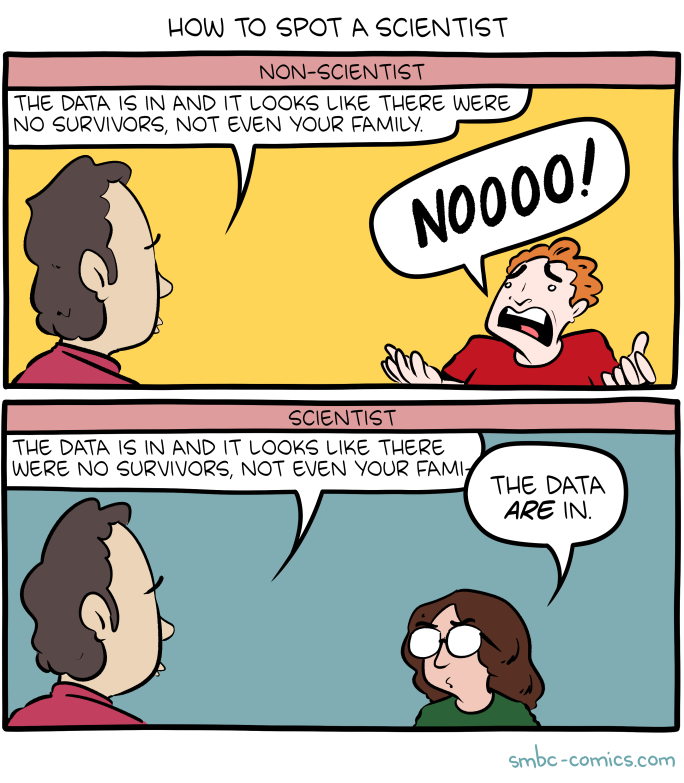Scientist spotting
« previous post | next post »
Today's SMBC:
The mouseover title: "They are however quite pleased to have their dead family members listened in a spreadsheet."
The aftercomic:

Zach's wife aside, are scientists especially peevish about this residue of Latin morphology, more than humanists or lawyers or whatever? I wouldn't have thought so.

mg said,
May 22, 2022 @ 10:38 pm
Statisticians tradiationally are, though it seems to be dying out in younger generations.
Martin said,
May 23, 2022 @ 2:04 am
Journals still enforce it, so you get used to it, and then singular 'data' starts looking wrong…
Philip Taylor said,
May 23, 2022 @ 2:20 am
"listened in a spreadsheet" ? Not "listed" ? I know that's what the (original) text reads, but is it what the author intended ?
David Marjanović said,
May 23, 2022 @ 3:02 am
Scientist here. A few do insist on "data are", but most use "data is" on the model of "information is".
Which journals? I know one that I'm sure enforces it, but many ignore it completely.
Sophie said,
May 23, 2022 @ 4:35 am
American Medical Association style uses “data are.”
Roscoe said,
May 23, 2022 @ 5:47 am
In the same vein, there's "The Purist" by Ogden Nash:
I give you now Professor Twist,
A conscientious scientist,
Trustees exclaimed, "He never bungles!"
And sent him off to distant jungles.
Camped on a tropic riverside,
One day he missed his loving bride.
She had, the guide informed him later,
Been eaten by an alligator.
Professor Twist could not but smile.
"You mean," he said, "a crocodile."
Cervantes said,
May 23, 2022 @ 6:56 am
Data can be a mass noun, construed as singular. This is a common process of linguistic evolution. Viz. "mathematics," which is now always construed as singular. Absolutely nothing wrong with construing "data" as singular and most of the scientists I know do so routinely. Of course in that case it refers to a body of data, a single item in that body is still a datum, although that word has become uncommon. People are more likely to say a "data point."
Robert T McQuaid said,
May 23, 2022 @ 8:40 am
When a noun qualifies another, English uses the singular. So for example we have an apple tree, never an apples tree.
How many advocates of "these data" are silly enough to say that IBM is in the datum processing business?
Gregory Kusnick said,
May 23, 2022 @ 9:43 am
We may not have apples trees, but we do have sports fans, arts curricula, and dry goods stores. In the UK they have drugs offences and drinks parties.
In any case, the emphasis in "data processing" is on the processing of data in bulk, not as individual datums.
Philip Taylor said,
May 23, 2022 @ 9:49 am
Not invariably true, Robert — a fireworks display, for example.
Jonathan Smith said,
May 23, 2022 @ 10:02 am
@Robert T. McQuaid
me translating 漢字比賽: "Chinese character contest"
corrected by Chinese teacher: "Chinese characters contest"
me: OK EFL thing
my (U.S.) apartment complex: "guests parking only"
me:
Roy Sablosky said,
May 23, 2022 @ 10:35 am
American Sociological Association Style Guide, 5th ed.: "The word *data* is plural and takes a plural verb: 'The data, as reported in the appendix, are correct.'"
Thousands of journals use this style guide.
Mike Grubb said,
May 23, 2022 @ 10:58 am
Apparently, a correspondent, W.W. Keen (of Philadelphia), implored the JAMA to nip the use of "data is" in the bud, having already observed multiple instances of its use in the journal… in 1909. https://jamanetwork.com/journals/jama/article-abstract/430154
(Sorry, I lack the HTML skills to embed the link more artfully.)
Richard Hershberger said,
May 23, 2022 @ 11:08 am
Style guides: My limited experience of having my writing professionally copy edited is that about a quarter of the changes are genuinely beneficial, correcting grammatical slips (e.g. my writing tends to cycle between the past tense and the historical present, and benefits from another set of eyes to clean this up), a small but critical number of disastrous miscorrections (I have on two occasions had copy editors change a 19th century date to a 20th century date), with the bulk of the changes being pointless stuff to follow an arbitrary style guide. I let this last group slide. It doesn't improve the text, but neither does it do any harm. Mostly I wonder that publications spend money on this.
This is the cue for someone to explain to me that it is very very important that usage be uniform throughout the publication. I have not seen any persuasive argument for why this is, much less a good reason for the seemingly random list of shibboleths. I have never seen a style guide that cares whether the text includes or omits the relative pronoun when the object of the clause. Why is this a stylistic choice for the writer, while whether or not to use "data" as a mass noun is not? It is almost as if the list were of items people had peeved about, rather than deriving from considered analysis.
Brett said,
May 23, 2022 @ 12:10 pm
Some scientific journals enforce this rule. However, I don't remember ever encountering any scientists who were particularly insistent about it when not being forced to conform to such a style guide. So, to answer the question at the end of the post: No, I think it's just Kelly.
Thomas Lee Hutcheson said,
May 23, 2022 @ 1:13 pm
The media insist that "data" is plural. :)
Misha Schutt said,
May 23, 2022 @ 2:17 pm
Several patterns point to the idea that data is mass and not plural. *Many data, *several data, *three data, *a considerable number of data all sound much better with “data points.”
David Morris said,
May 23, 2022 @ 3:27 pm
> a fireworks display, for example
or an arm dealer
David L said,
May 23, 2022 @ 3:28 pm
This is the cue for someone to explain to me that it is very very important that usage be uniform throughout the publication.
Having worked at a number of publications, I can tell you that a certain subset of readers gets very agitated at inconsistencies and will write stern letters to the editors bemoaning the woeful lack of standards in the modern age, etc etc.
the seemingly random list of shibboleths
Many were put in place by an esteemed editors in ages past, and no one dares change them for fear of letters from the same subset of readers complaining that the hallmarks of a once-great journal are being willfully cast aside, etc etc.
Viseguy said,
May 23, 2022 @ 3:32 pm
@Richard Hershberger: I do feel that a periodical, whether scholarly or general-interest, does call for a degree of stylistic consistency. (Although, with regard to "data", insisting exclusively on "is" or "are" irrespective of the context may amount to a foolish consistency.) I would find it disconcerting if the style of my favorite newspaper varied from article to article depending on the preferences of individual reporters. In part it's the comfort of predictability, but also the reader's need for coherence, in style as much as in editorial content, layout, graphical content, etc. I appreciate, for example, that if I'm reading a magazine that calls itself a "newspaper", I know it's The Economist without even looking at the cover.
slz said,
May 23, 2022 @ 3:53 pm
As someone in astronomy, I can confirm that the major anglophone astronomy journals' style guides enforces that the word "data" is plural. This is true for the American journals Astronomical Journal and Astrophysical Journal [1] and the British Monthly Notices of the Royal Astronomical Society [2]. I haven't found any specific admonitions in the style guide of the European journal Astronomy & Astrophysics, but empirically they treat "data" as plural.
[1] https://journals.aas.org/manuscript-preparation/#style
[2] https://academic.oup.com/mnras/pages/General_Instructions#6.2%20Spelling,%20grammar,%20punctuation%20and%20mathematics
Richard Hershberger said,
May 23, 2022 @ 4:32 pm
@Viseguy: I find frankly bizarre the notion that I, the reader, should care about the consistent use of, for example, Oxford commas. Even more bizarre is the notion that I might care about Oxford commas, but not about the endless other choices in comma usage.
Look at the standard peeves and the quality they share is that they are easily described: Oxford commas, split infinitives, terminal prepositions, etc. I would submit that the reason people don't peeve about the inclusion or omission of relative pronouns as objects of the relative clause is that this would require the effort of having some clue about what these are. The peeve about the passive voice is at the outer edge. Many people who peeve about it don't actually understand what is and is not the passive voice, but they think they know. Relative clauses are a bridge too far, even for the pleasure of peeving.
Julian said,
May 23, 2022 @ 5:03 pm
Clearly there are a number of perspectives on this important question. Let's make it an agendum for our next meeting.
Barbara Phillips Long said,
May 24, 2022 @ 6:29 am
Style guides are useful when they smooth out differences that distract many readers, but they are less helpful when they reinforce peevery and shibboleths. Good editing reduces ambiguity and enhances clarity so the reader can proceed smoothly through the text.
When a word is essential but troublesome, as “data” is, a style guide makes editing easier because it can reduce the amount of argument and negotiation between editors and writers. Not everyone will be happy with the decisions made, but editors of style guides can revise their standards to improve the reading experience. Personally, I think a style guide loses credibility when it does not take common usage into consideration, unless the guide credibly explains why it has rejected a popular usage for a more prescriptive standard.
Cervantes said,
May 24, 2022 @ 7:03 am
"Data" as a mass noun is useful. Proscribing it makes communication more difficult. That's all that matters.
Brett said,
May 24, 2022 @ 8:26 pm
I forgot to mention the PhD comic on this subject: https://phdcomics.com/comics/archive.php?comicid=1816
languagehat said,
May 25, 2022 @ 7:27 am
@Viseguy: I find frankly bizarre the notion that I, the reader, should care about the consistent use of, for example, Oxford commas.
In other words, you find bizarre the notion that other people think differently than you do and care about things you don't care about. This is, alas, a widely shared approach to life, but that does not improve it.
Terpomo said,
May 25, 2022 @ 9:59 pm
Regarding 'data is' vs. 'data are' I defer to Randall Munroe.
https://xkcd.com/1429/